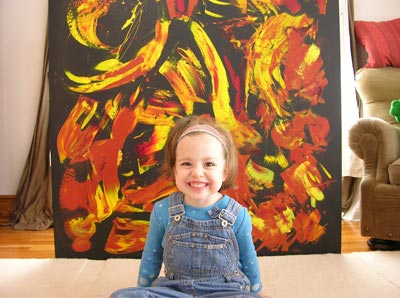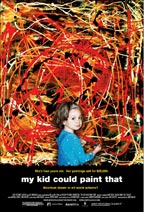Amir Bar-Lev My Kid Could Paint That Interview

AMIR TURNS THE CAMERA ON A KID WHO CAN PAINT
by Paul Fischer
Amir Bar-Lev has evolved into one of the most controversial and successful new wave of documentarians. My Kid Could Paint That is his second feature film. His directorial debut, Fighter (2001) was named one of the top documentaries of the year by Newsweek, The Rolling Stone, The Village Voice and several other major publications. It won 6 international awards, received "Two Thumbs Up" by Ebert and Roeper, and was called "Brilliant" by The New Yorker, "Enthralling" by New York Times, "Finniest film of the summer" by the New York Post and "one of the best documentaries of this year or any other by Rolling Stone. Fighter was released theatrically in the fall of 2001, and aired on the Independent Film Channel.
After Fighter and before beginning My Kid Could Paint That, Bar-Lev spent 4 years looking for a new project and working in television. He served as a creator and Executive Producer on several pilots, including Remix, a DJ competition, but it's his latest film causing quite the stir as it explores media, fame and parenthood. The film revolves around Marla Olmstead, an internationally acclaimed four-year-old painter, whose abstract paintings sold for as much as $25,000 a piece, but when her father was accused of secretly authoring the paintings, questions arise. Bar-Lev talked to Paul Fischer.
Paul Fischer: Can you tell me, start off by letting me know at what point did you first become aware of this family?
Amir Bar-Lev: Well, I read The New York Times story that is featured in the film. And I was intrigued by the many interesting questions brought up by the Marla phenomenon, the questions of celebrity, the questions of art, the questions of the way the media works, childhood. But when I met the Olmsteads, a few days after reading that article, I realized that those questions were going to play out in a pretty cinematic way. Because it so needn't have been this sort of dry, desiccation of these interesting academic things, because here you had a real life, very likable family, who was, I think, by their own admission, way in over their head. And had become overnight celebrities in a world they knew nothing about. It's a very interesting ride.
Paul Fischer: How cynical was the family when you first approached them?
Amir Bar-Lev: Cynical?
Paul Fischer: Yeah. And how reticent were they to let you in?
Amir Bar-Lev: They weren't at all reticent about me or anybody else in the media.
Paul Fischer: Until the 60 Minutes piece, I guess.
Amir Bar-Lev: Well, 60 Minutes showed up, I think, on the exact same day that I did. And in fact, you know, in the outtakes of my film, I have footage of them basically introducing themselves.
Paul Fischer: What surprised you about this family as you began or embarked on this cinematic journey?
Amir Bar-Lev: Well, I can tell you right off the bat that - I think I was expecting those type of show parents that you come to expect when you hear about a four-year-old international star. And they were anything but that type of show parents. And what surprised me and intrigued me from the beginning was their ambivalence about all the attention. You know, I felt like it was one of those stories, kind of like you hear about when someone wins the lottery. Often times it's the worst thing that ever happened to them. Well, you know, Laura - Laura, I think, one of her early quotes with me was - let me think. You know, a part of me hopes she never paints again. I can't remember whether that's in the film or not.
 Paul Fischer: I believe it is, yes.
Paul Fischer: I believe it is, yes.
Amir Bar-Lev: Yeah. I mean, to me, that is a very telling line, and a very serious line, you know?
Paul Fischer: But the father's perspective seems to be a little bit different. perspective.
Amir Bar-Lev: Yeah. I mean, you know. I think - I think that he was more enamored with the attention.
Paul Fischer: Do you think he comes across as more unsympathetic than Laura does?
Amir Bar-Lev: You know, I hope that one of the enjoyable things about this film is that there are no kind of cookie cutter characters. And, I read a review the other day which said that, Bar-Lev passes around the black hat. Meaning that nobody comes off a villain, and nobody comes off a hero, myself included. And, you know, I think there's a bunch of different ways to read all the characters. What is intriguing about it for me is that no one scenario has - you know, like, a perfect solved puzzle, to this day. You know. I have my opinions and the reason I answer your question that way is because - you know, you start to - you start to point out all those various scenarios, and you try and go with them as you have the impression that Mark seems less trustworthy, then you start to say, "Well, is it possible that he did the paintings and she didn't know"-none of those scenarios make total sense. I began this film not with the intention of making a perfect mystery, where I sat in the edit room, and I sort of with a bean counter kind of say, "Well, here's a pro, here's a con. Here's a pro, here's a con," because that wouldn't have been fair. I presented all the evidence that I had and you and audience members are going to have to conclude whatever they conclude.
And the thing that's been really gratifying for me as a filmmaker is that people are walking away from the cinema concluding wildly different things and it feels kind of like it reflects my own confusion in a nice way.
Paul Fischer: Did their attitude towards you change after the airing of the 60 Minutes piece?
Amir Bar-Lev: Well, did their attitude change me. I don't know if it changed towards me, but it certainly changed toward everyone else in the media.
Paul Fischer: But obviously that piece didn't change your own attitudes towards them.
Amir Bar-Lev: You know, the funny thing about it is that it wasn't the 60 Minutes piece that really started to - the whole thing was an evolution, you know? I mean, I had never had the beginnings of a shred of doubt before 60 Minutes. But it wasn't as though after 60 Minutes I concluded for myself that it was a Hoax. I wasn't really won over by 60 Minutes.
Paul Fischer: Are you surprised that movie has struck the kind of chord that it has?
Amir Bar-Lev: I think that there's a part of me that isn't very surprised, because I've been thinking about this for three years. And I have been astounded at how often I feel I see the Marla story in other stories. Whether it's James Frey, KT Leroy, Kid Nation now. I just was opening The New Yorker, even two weeks ago in The New Yorker there was the story of that pianist in England, Joyce Pado. The film strikes a chord, because basically we know so much about the world now through the media and the media can so easily skew the facts. That people are gonna see this film - in this film, they're gonna see their own questions about the way the media distorts things, and also the way the reality TV distorts things, and even the way that documentaries distort things, in they own way.
Paul Fischer: Have you kept in touch with the family since the film's release?
Amir Bar-Lev: We have a civil relationship. We sort of agree to disagree.
Paul Fischer: Have they seen the movie?
Amir Bar-Lev: They have, yeah. They saw it before Sundance. They sent a public statement to Sundance.
Paul Fischer: What do you hope to do next, at this point?
Amir Bar-Lev: It's funny, I have another film that I can't talk about yet, unfortunately.
Paul Fischer: Another documentary, I take it.
Amir Bar-Lev: Actually, I have two films. One is a documentary, and the other is a narrative film. I'm sorry that I can't exactly talk about either of them at this very moment.

Amir Bar-Lev has evolved into one of the most controversial and successful new wave of documentarians. My Kid Could Paint That is his second feature film. His directorial debut, Fighter (2001) was named one of the top documentaries of the year by Newsweek, The Rolling Stone, The Village Voice and several other major publications. It won 6 international awards, received "Two Thumbs Up" by Ebert and Roeper, and was called "Brilliant" by The New Yorker, "Enthralling" by New York Times, "Finniest film of the summer" by the New York Post and "one of the best documentaries of this year or any other by Rolling Stone. Fighter was released theatrically in the fall of 2001, and aired on the Independent Film Channel.
After Fighter and before beginning My Kid Could Paint That, Bar-Lev spent 4 years looking for a new project and working in television. He served as a creator and Executive Producer on several pilots, including Remix, a DJ competition, but it's his latest film causing quite the stir as it explores media, fame and parenthood. The film revolves around Marla Olmstead, an internationally acclaimed four-year-old painter, whose abstract paintings sold for as much as $25,000 a piece, but when her father was accused of secretly authoring the paintings, questions arise. Bar-Lev talked to Paul Fischer.
Paul Fischer: Can you tell me, start off by letting me know at what point did you first become aware of this family?
Amir Bar-Lev: Well, I read The New York Times story that is featured in the film. And I was intrigued by the many interesting questions brought up by the Marla phenomenon, the questions of celebrity, the questions of art, the questions of the way the media works, childhood. But when I met the Olmsteads, a few days after reading that article, I realized that those questions were going to play out in a pretty cinematic way. Because it so needn't have been this sort of dry, desiccation of these interesting academic things, because here you had a real life, very likable family, who was, I think, by their own admission, way in over their head. And had become overnight celebrities in a world they knew nothing about. It's a very interesting ride.
Paul Fischer: How cynical was the family when you first approached them?
Amir Bar-Lev: Cynical?
Paul Fischer: Yeah. And how reticent were they to let you in?
Amir Bar-Lev: They weren't at all reticent about me or anybody else in the media.
Paul Fischer: Until the 60 Minutes piece, I guess.
Amir Bar-Lev: Well, 60 Minutes showed up, I think, on the exact same day that I did. And in fact, you know, in the outtakes of my film, I have footage of them basically introducing themselves.
Paul Fischer: What surprised you about this family as you began or embarked on this cinematic journey?
Amir Bar-Lev: Well, I can tell you right off the bat that - I think I was expecting those type of show parents that you come to expect when you hear about a four-year-old international star. And they were anything but that type of show parents. And what surprised me and intrigued me from the beginning was their ambivalence about all the attention. You know, I felt like it was one of those stories, kind of like you hear about when someone wins the lottery. Often times it's the worst thing that ever happened to them. Well, you know, Laura - Laura, I think, one of her early quotes with me was - let me think. You know, a part of me hopes she never paints again. I can't remember whether that's in the film or not.
 Paul Fischer: I believe it is, yes.
Paul Fischer: I believe it is, yes.Amir Bar-Lev: Yeah. I mean, to me, that is a very telling line, and a very serious line, you know?
Paul Fischer: But the father's perspective seems to be a little bit different. perspective.
Amir Bar-Lev: Yeah. I mean, you know. I think - I think that he was more enamored with the attention.
Paul Fischer: Do you think he comes across as more unsympathetic than Laura does?
Amir Bar-Lev: You know, I hope that one of the enjoyable things about this film is that there are no kind of cookie cutter characters. And, I read a review the other day which said that, Bar-Lev passes around the black hat. Meaning that nobody comes off a villain, and nobody comes off a hero, myself included. And, you know, I think there's a bunch of different ways to read all the characters. What is intriguing about it for me is that no one scenario has - you know, like, a perfect solved puzzle, to this day. You know. I have my opinions and the reason I answer your question that way is because - you know, you start to - you start to point out all those various scenarios, and you try and go with them as you have the impression that Mark seems less trustworthy, then you start to say, "Well, is it possible that he did the paintings and she didn't know"-none of those scenarios make total sense. I began this film not with the intention of making a perfect mystery, where I sat in the edit room, and I sort of with a bean counter kind of say, "Well, here's a pro, here's a con. Here's a pro, here's a con," because that wouldn't have been fair. I presented all the evidence that I had and you and audience members are going to have to conclude whatever they conclude.
And the thing that's been really gratifying for me as a filmmaker is that people are walking away from the cinema concluding wildly different things and it feels kind of like it reflects my own confusion in a nice way.
Paul Fischer: Did their attitude towards you change after the airing of the 60 Minutes piece?
Amir Bar-Lev: Well, did their attitude change me. I don't know if it changed towards me, but it certainly changed toward everyone else in the media.
Paul Fischer: But obviously that piece didn't change your own attitudes towards them.
Amir Bar-Lev: You know, the funny thing about it is that it wasn't the 60 Minutes piece that really started to - the whole thing was an evolution, you know? I mean, I had never had the beginnings of a shred of doubt before 60 Minutes. But it wasn't as though after 60 Minutes I concluded for myself that it was a Hoax. I wasn't really won over by 60 Minutes.
Paul Fischer: Are you surprised that movie has struck the kind of chord that it has?
Amir Bar-Lev: I think that there's a part of me that isn't very surprised, because I've been thinking about this for three years. And I have been astounded at how often I feel I see the Marla story in other stories. Whether it's James Frey, KT Leroy, Kid Nation now. I just was opening The New Yorker, even two weeks ago in The New Yorker there was the story of that pianist in England, Joyce Pado. The film strikes a chord, because basically we know so much about the world now through the media and the media can so easily skew the facts. That people are gonna see this film - in this film, they're gonna see their own questions about the way the media distorts things, and also the way the reality TV distorts things, and even the way that documentaries distort things, in they own way.
Paul Fischer: Have you kept in touch with the family since the film's release?
Amir Bar-Lev: We have a civil relationship. We sort of agree to disagree.
Paul Fischer: Have they seen the movie?
Amir Bar-Lev: They have, yeah. They saw it before Sundance. They sent a public statement to Sundance.
Paul Fischer: What do you hope to do next, at this point?
Amir Bar-Lev: It's funny, I have another film that I can't talk about yet, unfortunately.
Paul Fischer: Another documentary, I take it.
Amir Bar-Lev: Actually, I have two films. One is a documentary, and the other is a narrative film. I'm sorry that I can't exactly talk about either of them at this very moment.

My Kid Could Paint That
FIGHTER helmer Amir Bar-Lev directs this documentary about a four-year-old girl whose paintings sell for thousands of dollars. As questions arise about the validity of the prodigy's talents, Bar-Lev examines both the girl's abilities and the nature of art itself.
MORE



